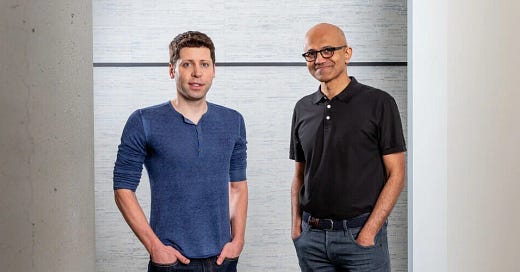OpenAI cuts the cord
The company behind ChatGPT signed a $11.9 billion deal to reduce Microsoft reliance
OpenAI is wasting no time. Just two months after ending its exclusivity clause with Microsoft, the company behind ChatGPT has struck a major commercial partnership with CoreWeave. The five-year, $11.9 billion deal will allow OpenAI to train and run its generative AI models on CoreWeave’s cloud platform, which specializes in high-performance computing for AI workloads.
Ironically, the start-up’s main client until now has been Microsoft, which relied on the its cloud platform to supplement its computing power—particularly to support OpenAI. This move underscores OpenAI’s massive computing needs as it scales up its AI ambitions. More significantly, it signals a shift: the success of its ambitious roadmap depends less and less on its historic partner.
$13 billion investment
OpenAI’s ties with Microsoft date back to 2019, when the AI startup—just four years old—needed more funding to continue its research. The Redmond-based group first injected a billion dollars, partly in cloud credits. Over the years, its total investment grew to around $13 billion.
In return, OpenAI agreed to use only Microsoft’s Azure cloud infrastructure. It granted him exclusive distribution rights for its AI models in the cloud, and the majority of its profits up to a certain threshold. However, tensions have risen in recent months. OpenAI reportedly criticized Microsoft for not providing enough computing resources to train its latest models.
Facing these limitations, OpenAI obtained Microsoft’s approval last summer to partner with Oracle. The deal includes building a dedicated data center to train future models, already under construction in Texas and set to open later this year. This agreement paved the way for an even more ambitious initiative. In early January, OpenAI unveiled Stargate, a colossal $500 billion project announced at the White House
A fractured partnership
Over the next four years, the company and its partners, Oracle and the Japanese conglomerate Softbank, plan to build 20 massive data centers across the US. Its CEO Sam Altman sees this as a critical step toward developing artificial general intelligence (AGI)— an AI that can learn and reason independently. Yet, questions loom over financing, especially as Chinese competitor DeepSeek makes rapid advances in AI.
The unraveling of OpenAI’s exclusivity deal with Microsoft was accelerated by the fallout from Sam Altman’s attempted ousting. Microsoft’s leadership became concerned on their growing dependency, at a time when OpenAI was beginning to market its own tools to businesses. At the end of 2023, they refused to inject further billions of dollars into the start-up.
OpenAI was forced to seek additional funding from other investors. As part of this effort, the company agreed to restructure its legal status, allowing it to freely distribute its profits. This transition represents another point of contention with Microsoft, because the two companies must now renegotiate the terms of their original agreement.




